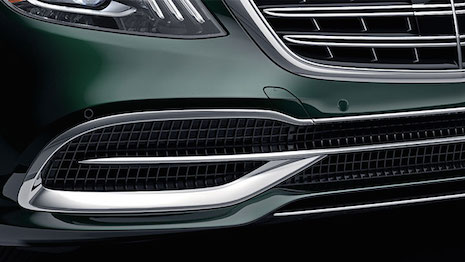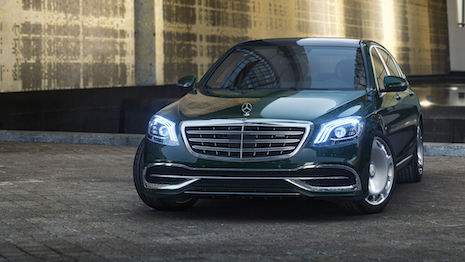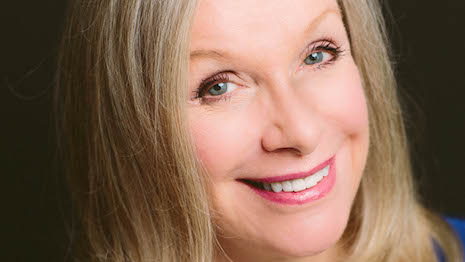- About
- Subscribe Now
- New York,
August 22, 2018

 Stately, yet understated: Mercedes Maybach 2018 S Sedan grille and lights view. Image credit: Mercedes-Benz USA
Stately, yet understated: Mercedes Maybach 2018 S Sedan grille and lights view. Image credit: Mercedes-Benz USA
In the current United States culture sharply divided right or left, conservative or liberal, Republican or Democrat, most luxury brands generally do not think much about the political leanings of their customers. They tend to be inclusive to not alienate affluent customers with either a conservative or liberal viewpoint. But that may have to change.
Two new studies out of academia uncover important implications for luxury marketing and branding in today’s politically-divisive environment. The research shows that marketing and branding messages that work for Republicans or conservative-leaning affluents may fall flat on – even distance – Democrat or liberal-leaning ones and vice versa.
Republican-Democratic income divide
Luxury-brand inclusivity, however, only extends to those who can afford to buy, excluding those lacking the financial resources to pay the price. Generally, that means Republicans, rather than Democrats.
A 2016 Pew poll found Republican/Republican-leaning (49 percent) voters are slightly ahead of Democrat/Democratic-leaning (45 percent) voters at the $75,000-plus income levels. But a more detailed analysis by income shows two segments pop: low-income and mass-affluent voters.
At the lowest income level, under $30,000, some 60 percent of voters are Democrats/Democrat-leaning versus 32 percent Republican/Republican-leaning.
At the mass-affluent level, $100,000-$149,900 – what I call HENRYs (high-earners-not-rich-yet) – some 51 percent are Republican/Republican-leaning as compared with 45 percent that are Democrat/Democrat-leaning.
For those in the highest-income bracket measured – more than $150,000 – there is only a 2 percentage-point difference, not statistically significant, with 46 percent Republican/Republican-leaning and 48 percent Democrat/Democrat-leaning.
While there are many wealthy people that align themselves with Democrat or liberal causes, the fact is a higher percentage of lower-income Americans tend to affiliate with the Democrats, too.
In other words, there is a longer tail among Democrats than Republicans when measuring income distribution.
An evening with guests including Kristen Stewart, Lily-Rose Depp and Margot Robbie at the Grand Palais in Paris for the Chanel Cruise 2018/19 show. Video credit: Chanel
Marketing luxury to Republicans
Regardless of the numbers, affluent Republicans represent an important segment of a luxury brands’ target customers. A new study published in the Journal of Marketing sheds light on targeting them.
The researchers found that Republicans trade up to luxury brands for reasons that do not necessarily motivate Democrats.
Affluent Republicans buy luxury to reinforce their social standing, but not specifically to elevate it. Democrats show no such inclination.
The research, headed by Jeehye Christine Kim, assistant professor of marketing at Hong Kong University of Science and Technology, studied the difference between maintaining one’s high-social status with luxury goods purchases and elevating ones’ status through buying and displaying the icons of luxury.
For Republicans, status maintenance, but not status advancement, was pronounced. The researchers attribute this to conservatives’ greater desire “to preserve socioeconomic order and maintain existing social hierarchies.”
“It’s not that Republicans are more obsessed with luxury goods or they like to flaunt their wealth,” Ms. Kim said in an interview. “It’s that in some ways they’re more afraid. They fear they may fall further behind, so they want to hold their ground by consuming luxury goods.”
There are two important implications from this study.
First, Republicans in particular are not motivated to buy luxury as a way “to keep up with the Joneses” or to achieve higher status in their social sphere, but as a way to reinforce their position and maintain their social standing.
So, the increasingly popular influencer-marketing strategies and celebrity-endorsed branding messages may have little resonance with politically-conservative affluents. That being so, the Patek Phillipe “Generations” ad campaign – “You never actually own a Patek Phillipe. You merely look after it for the next generation” – is spot on.
And since Republicans are keen on conserving the status quo, luxury brands aiming to align with that mindset should hearken to their heritage, such as Burberry, Tiffany, Chanel and Louis Vuitton, all of which have a proud history to call upon.
Second, Republicans are more likely to be the first to pull back on luxury spending when their economic radar signals a change in the wind.
Popularly referred to as the “Lipstick Effect,” it theorizes that consumers sensing an economic crisis will trade down to less expensive luxury goods, favoring little luxuries that give the consumer a feeling of indulgence without the high-price tag.
So, instead of buying expensive handbags or shoes, a woman will purchase instead a luxury-brand lipstick or perfume.
The quest for freedom and adventure in faraway places – this is Louis Vuitton’s Spirit of Travel ad. Video credit: Louis Vuitton
With the memory of the last recession still fresh, most luxury brands have a cadre of lower-priced products in their collections to shore up sales in case of an economic downturn when the Lipstick Effect takes hold.
That said, it may be prudent for luxury brands to update their customer file with political affiliation and keep tabs on their Republican customers’ spending trend as a bellwether for when a bigger change is coming.
“Republican consumers are susceptible to economic or political uncertainty because conservative ideology naturally tends towards the conservation of the hierarchy and the preservation of status,” said David Dubois, associate professor of marketing at INSEAD who also participated in the study.
The latest addition of Patek Philippe's "Generations" advertising, with timeless black-and-white imagery, showcases the bond between father and son. Video credit: Patek Philippe
Liberal affluents favor purchases that distinguish them uniquely
Though the Journal of Marketing study is thought provoking, it does not provide any specific takeaways for luxury brands’ more liberal or Democrat customers.
Filing that gap comes a study from the August 2018 issue of the Journal of Consumer Research, entitled “Better or Different? How Political Ideology Shapes Preferences for Differentiation in the Social Hierarchy,” led by Nailya Ordabayeva, assistant professor of marketing at Boston College.
In multiple studies the researchers found that people holding a liberal ideology chose products/brands that signaled they were different and unique from others – for example, Urban Outfitters, coffee cups with “Just Different” messaging – while conservatives preferred products/brands that were perceived as better or elevated above the rest – for example, Ralph Lauren, coffee cups with “Just Better” messaging.
The authors explain, “Liberals tended to differentiate themselves through products that show that they are unique from others – for example, by choosing products with unconventional designs or colors.”
By contrast, the authors postulate, conservatives chose high-status, luxury brands that signal superiority “as legitimate reflections of their favorable individual qualities such as hard work and motivation,” adding that conservatives tend to “endorse social hierarchies as reflecting legitimate differences in people’s skills and work ethic.”
Liberals, on the other hand, tend to reject such hierarchical or dominance-based social structures and so select products/brands that “signal their unique identities in alternative, non-conventional ways.”
Interestingly, people’s perception of whether something is better or superior for conservatives, or unique for liberals can be manipulated.
In a controlled experiment, half the respondents were told that wearing a red outfit to a professional networking event would make them stand out, with red being described as “the color of originality, rebelliousness and edge in the 21st century.”
The other group was told red was the color of “success, prosperity and accomplishments in the 21st century.”
In this experiment conservatives were much more interested in wearing red when it was positioned as superior, and liberals were much more interested in wearing red when it was positioned as unique.
The researchers conclude, “This ultimately means that if conservatives’ and liberal’s perceptions of hierarchical structures can be reconciled, at least temporarily, the differences in their product preferences may also be bridged.”
The actionable takeaways from this look at political leanings and brand preferences are that brand positioning around superior quality has greater appeal to more conservative customers, while uniqueness and distinctiveness appeals more to liberals. Combining the two will likely broaden the appeal to those of both political persuasions.
In addition, a brand’s advertising can be enhanced by aligning the message with specific positioning tailored to the different audiences of conservative or liberal media, such as superior quality for Fox News and uniqueness for MSNBC.
The researchers further point out that brands should be attuned to regional differences, with red states being better for Ralph Lauren and “similarly-signaling products and concepts,” while Urban Outfitters and “similar uniqueness-signaling products and concept” will do better in blue states.
 Mercedes Maybach S Class 2018 sedan. Image credit: Mercedes-Benz USA
Mercedes Maybach S Class 2018 sedan. Image credit: Mercedes-Benz USA
BOTH STUDIES provide an interesting perspective on political ideology as it impacts consumer behavior. At least in today’s politically-polarized culture, it is certain that more research will be directed here.
I, for one, take issue with Ms. Ordabayeva’s assumption that conservatives gravitate to superior products or brands because they necessarily want to be perceived as superior to others. Rather, I think that conservatives’ brand choices favoring better quality may simply mean they shy away from brands perceived as too “out there,” too trendy or too unique, in favor of brands that are better, safer and more conservative.
Choosing what is perceived as a superior quality luxury brand may not have anything to do with trying to present oneself as better or superior to another. Rather it may be an example of the classic L’Oreal ad inviting women to spend more for L’Oreal hair color, “Because I’m worth it,” not because others will see me as better because of it.
Christopher P. Ramey, president of Affluent Insights, a firm that studies the ultra-high-net-worth market, also cautions not to put too much emphasis on social status as a trigger to buy luxury.
“Status is historically a factor for newly-minted affluents,” Mr. Ramey said. “The longer one has wealth, the less likely he or she is to care about status or impressing anyone.”
“An informed individual who’s lived with wealth is more likely to appreciate and value fine products, what others may call luxury,” he said. “But when one can afford anything, those products aren’t luxury. It’s just how they live.”
Point in case: The Mercedes-Maybach is made less conspicuous with a logo missing from its grill, while the least expensive C-Class Mercedes has the brand’s largest grill logo.
 Pam Danziger is president of Unity Marketing
Pam Danziger is president of Unity Marketing
Pamela N. Danziger is Stevens, PA-based president of Unity Marketing and Retail Rescue, and a luxury marketing expert. Reach her at pam@unitymarketingonline.com.
Share your thoughts. Click here